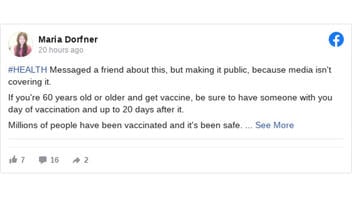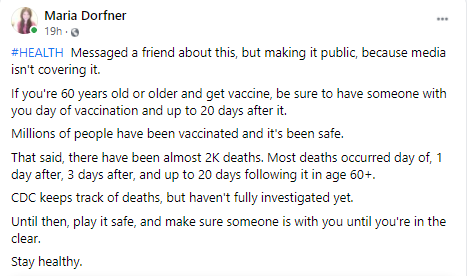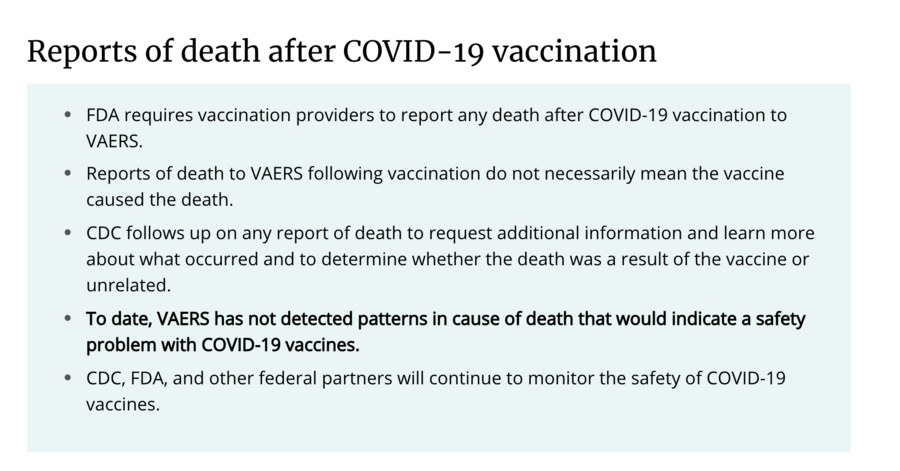STORY UPDATED: check for updates below.

Did 2,000 people die from the COVID-19 vaccine and do people over 60 need someone to stay with them for up to 20 days after getting the vaccine, as a health precaution? No, that is misleading. There is no proof that the deaths of people who have been vaccinated were caused by the COVID-19 shots. Multiple experts told Lead Stories that there is no need for someone to stay with people 60 and over for 20 days after getting the vaccine to ensure they are healthy.
The claim appeared as a post (archived here) where it was published by Maria Dorfner on Facebook on March 17, 2021. It opened:
#HEALTH Messaged a friend about this, but making it public, because media isn't covering it.
If you're 60 years old or older and get vaccine, be sure to have someone with you day of vaccination and up to 20 days after it.
This is what the post looked like on Facebook at the time of writing:
(Source: Facebook screenshot taken on Thu Mar 18 17:39:18 2021 UTC)
A screengrab of the post shows the complete message:
(Source: Facebook screenshot taken on Thu Mar 18 17:39:18 2021 UTC)
Dorfner, a journalist, claims in her post "there have been almost 2K deaths," and people that are older than 60 should have someone with them after they get the COVID-19 vaccine "until you're in the clear."
The number of deaths she is referring to comes from the unverified list of reports of post-vaccination health issues that is operated by the U.S. Centers for Disease Control and the Food and Drug Administration. The individual cases in the system, as the Vaccine Adverse Effects Reporting System (VAERS) administrators clearly state, have not been verified.
Dr. George Rutherford, professor of epidemiology and biostatistics at UCSF School of Medicine, told Lead Stories "there is no relationship" between COVID-19 vaccine and deaths.
"Older people get vaccines, older people die (age is the greatest risk factor for death)," Rutherford told Lead Stories via email on March 18, 2021.
We asked Rutherford if people over 60 needed someone to stay with them for weeks to watch them for health precautions and he told Lead Stories, "not at all."
Dr. Alison C. Roxby, a professor in the University of Washington Department of Global Health also shut down the claims in an email to Lead Stories on March 18, 2021.
I am an expert on Covid vaccines and older adults. There is absolutely no requirement to observe an older adult for 20 days. The CDC reports that sometimes people have vaccine-related symptoms for 24-48 hours after vaccination, typically minor, and older adults have the lower incidence of vaccine related side effects.
Claims of mortality after COVID vaccines have typically been false. At this moment, 78 million Americans are reported to have received vaccines, with an additional 100s of millions of people immunized worldwide. Therefore, there will be natural mortality in people who are recently vaccinated, especially since the goal has been to vaccinate the oldest and frailest people first. VAERS has not seen unexpected mortality, and mortality has gone down dramatically among people in long term care facilities post-vaccination.
I feel very confident recommending this vaccine to older adults, and there is no need for additional observation."
Dorfner provided a link to the Centers for Disease Control and Prevention (CDC) website in the comments on her post as the source of her 2,000 number. The link shared details from the VAERS tracking system that claim "1,913 reports of death among people who received a COVID-19 vaccine."
VAERS administrators have had to repeatedly remind mis-users of such numbers that VAERS is a simple list of anyone-can-submit reports from patients, family and professionals. It is intended as an early warning system, so that a cluster of problems can be spotted and researched. The individual reports have not been verified and may or may not have anything to do with a patient having been vaccinated. Dorfner's number does not reflect a number of people who died because of a COVID-19 vaccine. Here's what the CDC said about death reports on the VAERS list:
Over 109 million doses of COVID-19 vaccines were administered in the United States from December 14, 2020, through March 15, 2021. During this time, VAERS received 1,913 reports of death (0.0018%) among people who received a COVID-19 vaccine. CDC and FDA physicians review each case report of death as soon as notified and CDC requests medical records to further assess reports. A review of available clinical information including death certificates, autopsy, and medical records revealed no evidence that vaccination contributed to patient deaths. CDC and FDA will continue to investigate reports of adverse events, including deaths, reported to VAERS."
The VAERS website explains the limitations of the list of reports in multiple ways, including with this chart:
Dr. Timothy Brewer, professor of epidemiology at the UCLA Fielding School of Public Health, and a member of the Division of Infectious Diseases at the David Geffen School of Medicine at UCLA, emailed with Lead Stories on March 19, 2021.
Approximately 8,000 people die every day in the US out of a population of 331 million, or 0.0024% of the population dies daily. People > 60 will die at a higher rate than the general population (which includes younger individuals). One could explain a 0.0018% mortality among COVID-19 vaccine recipients by random chance, but one would still want to investigate deaths among people who were vaccinated to make sure there is no association. The CDC and FDA have not released data from these investigations, but report that there "no evidence that vaccination contributed to patient deaths."
He also shared his expert opinion on people over 60 needing someone to stay with them for weeks after getting the vaccine.
At this time there is no evidence to recommend that individuals > 60 years old have someone stay with them for 20 days after receiving a COVID-19 vaccine."
Lead Stories published a fact check on February 15, 2021, with a comment from U.S. Food and Drug Administration press officer Alison Hunt, who explained how VAERS reports that include death are investigated.
Notably, the reports to VAERS are unverified reports; the report of an adverse event to VAERS is not documentation that a vaccine caused the event. Additional details on the limitations of VAERS data can be found here: https://vaers.hhs.gov/data/dataguide.html.
Updates:
-
2021-03-19T19:35:15Z 2021-03-19T19:35:15Z Updated to include comments from Dr. Timothy Brewer.




















